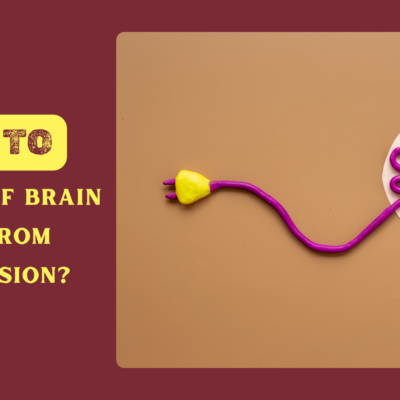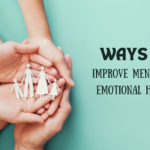How to Get Rid of Brain Fog from Depression: Brain fog is a common and frustrating symptom associated with depression, where individuals experience cognitive difficulties such as poor memory, lack of focus, confusion, and difficulty thinking clearly. It’s as if a mental cloud is hanging over the mind, affecting one’s ability to function at their best. While brain fog is a challenging aspect of depression, it is not permanent and can be alleviated through a combination of lifestyle changes, therapy, medication, and self-care. If you or someone you know is struggling with brain fog due to depression, here’s a comprehensive guide on how to get rid of it.
Also Read:
- Creative Eating Disorder Solutions to Try.
- Mental Breakdown- Signs, Causes and Treatment.
- Benefits of Walking in Nature on Mental Health.
Understand the Link Between Depression and Brain Fog
To effectively manage brain fog, it’s important to understand how depression contributes to cognitive impairment. Depression often affects neurotransmitters in the brain, including serotonin, dopamine, and norepinephrine, which are responsible for mood regulation and cognitive function. When these chemicals are imbalanced, they can lead to symptoms like fatigue, lack of concentration, and an overall sense of mental slowness—commonly referred to as brain fog.
Additionally, depression can affect sleep, leading to poor rest and further exacerbating cognitive issues. The more severe the depression, the more pronounced these cognitive challenges can become. Fortunately, managing depression itself is a key step in reducing brain fog.
How to Get Rid of Brain Fog from Depression:
Seek Professional Help for Depression
The most effective way to treat brain fog resulting from depression is by addressing the underlying condition—depression itself. Consulting with a mental health professional, such as a psychologist or psychiatrist, is an essential first step.
- Therapy: Cognitive Behavioral Therapy (CBT) is one of the most effective therapeutic approaches for depression. CBT helps individuals recognize negative thought patterns and replace them with more balanced and constructive ones. Therapy can also provide strategies to improve focus, reduce stress, and improve mental clarity.
- Medication: In some cases, medications such as antidepressants (SSRIs, SNRIs, or other classes of drugs) may be prescribed to help correct the chemical imbalances in the brain. These medications can improve mood and help alleviate symptoms of brain fog over time. Always consult with a healthcare provider about the best medication for your specific needs.
Improve Your Sleep Quality
Sleep deprivation is one of the primary contributors to brain fog. Depression can severely impact sleep patterns, causing either insomnia (difficulty falling or staying asleep) or hypersomnia (excessive sleeping). Poor sleep not only exacerbates depression but also impairs cognitive function, memory, and focus.
Here are some strategies to improve sleep quality:
- Create a Sleep Routine: Try to go to bed and wake up at the same time each day. This helps regulate your body’s internal clock and promotes better sleep.
- Limit Stimulants: Avoid consuming caffeine, nicotine, and alcohol, especially in the evening. These substances can interfere with your sleep patterns.
- Create a Sleep-Friendly Environment: Keep your bedroom cool, dark, and quiet. Consider using blackout curtains, earplugs, or a white noise machine if necessary.
- Relaxation Techniques: Engage in relaxation exercises like deep breathing, progressive muscle relaxation, or meditation before bed to calm your mind and prepare for restful sleep.
Exercise Regularly
Regular physical activity has a profound impact on both mental and physical well-being. Exercise stimulates the release of endorphins (the “feel-good” hormones) and serotonin, which can alleviate symptoms of depression and improve mental clarity.
- Aerobic Exercise: Activities like walking, jogging, swimming, or cycling can significantly boost mood and cognitive function.
- Strength Training: Incorporating strength training or resistance exercises into your routine can also improve overall energy levels, self-esteem, and cognitive function.
- Mind-Body Practices: Yoga and Tai Chi are particularly effective at improving mental clarity, reducing stress, and promoting relaxation.
Even if you feel too fatigued to engage in intense exercise, light physical activities such as a gentle walk around the block can provide significant benefits for both body and mind.
Eat a Balanced, Brain-Boosting Diet
Nutrition plays a crucial role in brain health, and consuming a well-balanced diet can help alleviate the symptoms of brain fog. Depression can lead to poor dietary habits, either by causing a lack of appetite or encouraging overeating of unhealthy foods. Eating nutrient-rich meals is essential for stabilizing mood and cognitive function.
Here are some dietary tips for supporting brain health:
- Consume Omega-3 Fatty Acids: These healthy fats are essential for brain function and can be found in fatty fish like salmon, mackerel, and sardines, as well as flaxseeds, chia seeds, and walnuts.
- Increase Antioxidant-Rich Foods: Berries, leafy greens, and colorful vegetables are rich in antioxidants, which help reduce inflammation and oxidative stress in the brain.
- Limit Processed Foods and Sugars: Highly processed foods, refined sugars, and trans fats can worsen inflammation and disrupt brain function, so it’s important to limit these in your diet.
- Stay Hydrated: Dehydration can worsen symptoms of brain fog. Ensure you’re drinking enough water throughout the day to keep your mind sharp.
Practice Mindfulness and Stress-Reduction Techniques
Chronic stress is a major contributor to brain fog and can worsen depression. Learning how to manage stress effectively is crucial for mental clarity and emotional well-being. Mindfulness and relaxation techniques can help calm the mind, reduce anxiety, and improve focus.
- Mindfulness Meditation: Practicing mindfulness meditation can help you develop awareness of your thoughts and emotions, reduce rumination, and foster a sense of calm.
- Deep Breathing: Slow, deep breathing exercises activate the parasympathetic nervous system, which can reduce stress and improve cognitive performance.
- Progressive Muscle Relaxation (PMR): This technique involves tensing and relaxing various muscle groups in the body to promote physical and mental relaxation.
Limit Multitasking
While multitasking may seem like a way to increase productivity, it can actually contribute to cognitive overload and worsen brain fog. Try to focus on one task at a time, and break tasks into smaller, manageable steps. Use to-do lists and set timers for tasks to help stay on track and reduce mental strain.
Consider Supplements
While a healthy diet is the best way to get essential nutrients, certain supplements can support brain health and alleviate symptoms of brain fog. Always consult with a healthcare provider before adding any new supplements to your regimen.
- Vitamin D: Low levels of vitamin D are associated with depression and cognitive impairment. Consider taking a vitamin D supplement if your levels are low.
- B Vitamins: B vitamins, particularly B12 and folate, are essential for brain function. These can be found in animal products or taken as supplements.
- Magnesium: Magnesium plays a key role in mood regulation and cognitive function. It can be found in leafy greens, nuts, seeds, and legumes.
Build a Support System
Depression can feel isolating, but having a strong support system is crucial for recovery. Whether it’s friends, family, or a mental health professional, talking to others and sharing your feelings can alleviate stress, reduce the feeling of brain fog, and promote healing. Support groups for depression are also a great way to connect with others facing similar challenges.
At The End
Brain fog is a challenging symptom of depression, but it is possible to manage and reduce it by addressing both the physical and emotional aspects of the condition. By seeking professional help, improving sleep, exercising, eating a balanced diet, practicing mindfulness, and utilizing stress-reduction techniques, you can significantly improve mental clarity and function. It may take time, but with persistence, you can overcome brain fog and regain control over your cognitive health. Always consult with a healthcare provider before making significant changes to your routine or starting new treatments.








